Becoming a Leader in Your Team
A presentation at You Got This! by Jason St-Cyr

Stepping up - Becoming a leader in your team
Welcome to Stepping up – Becoming a leader in your team Hello folks! I hope you’ve been enjoying all the great sessions so far. My name is Jason, and I hail from the town of Ottawa, in Canada. I lead our Developer Relations efforts over at Sitecore.
Today, I want to chat with you about that awkward moment when you go from being just another one of the team, to then leading that team.
When you first transition to go from member of the team to leading that same team, usually it is because you demonstrated some sort of expertise. Some sort of “leadership quality“, maybe. Others see it. Maybe you are really opinionated. Maybe you are really passionate about something you believe in. Maybe you’ve shown you can really work up and down the ladder and across departments. Whatever it is, people see that you have “it“. Now they want you to take this on.
Then your teammates start calling you “boss”.
But while you’re doing this, you’re finding it hard, to try to give away being the hero, building the thing, saving the day, being that expert. There’s a dopamine hit you get every time you push a task to done. And taking on strategic work, it could take months, it could take quarters, it could take years before you see success from your efforts. So it can be hard to let that go of that other side of the world.
I want to talk to you about the times where I’ve had to go through this transition myself, and hopefully how you can learn from what I went through.

Agenda
I want to take a look at a few challenges over the course of this session:
- First, how do we learn to delegate, and kind of balance our independent and manager roles?
- Next, why don’t we take a look at how we switch your mindset away from not being the subject matter expert anymore, not being the hero, and instead being the coach?
- We also want to take a look at that “in the middle” part of middle management
- And finally wrap up with a little bit about mental health and trying to prevent burnout

Power of Stories
You might have noticed a little bit of a theme around toys. This talk is a lot about stories, and what we learn from them. Now as a dad, I’m finding that stories are a great way to use toys and teach my kids about something and have it resonate.
Stories allow for us to create an emotional connection. It also allows us to have an easy recall for something. So, for example, if you’re into Star Wars, I might say something like “Let the Wookie win” and you’d know exactly what point in that story I’m referring to and you’d be transported back to it.
So, we’re going to go through a lot of stories today, and hopefully you are going to be able to use those stories to come back to a learning moment. And for those of you out there creating your own stories right now, make sure that as you’re learning, you are creating those recall moments that you can come back to.
Now let’s get started!

Letting it go
Now the first challenge I wanted to talk about is delegation. When I speak with my colleagues and other managers, a lot of us have had the same experience. In general, it seems to be very hard when you’re inside of a team, and transition to leading it, to give up some of those tasks that you used to be doing. This was definitely true for me.

To delegate, or not to delegate
The first management role I took over, I was in a small product company, leading the R&D group. Smart team, really great people. I found I was doing a lot of development work, even though I was supposed to be managing the team.
Now I look back at it, and, I guess what happened is, I gave myself a choice. I said to myself:
- Hey, you could throw away almost a decade of experience and everything you’re good at and really focus in on this management job
- Or, you could do two jobs really poorly,
- Or, you could do both jobs and try to do both well!
So of course I went with that option, right? I learned so much: I learned about SWOT analysis, I learned about product management, release management… and how to burn out in under a year.
It was super tough to give up those tasks that I was used to doing. I knew I could do them, I knew it would take time for me to get somebody else to do it. Not only that, everybody’s plate is super full, so if I’m giving this to somebody else, something’s going to drop. How do I need to handle this?
Eventually, I burnt out, I left that job, somebody had to pick up those tasks anyway, except now I wasn’t there to help or guide them through it. And you know what? They did great. I was the only one preventing that team from going forward. That was a big learning moment for me.

Am I holding the reins or pulling the sleigh?
Now I’ve had this scenario repeat a few times, where I’ve done this transition into leading the team, and it was hard to let it go. I knew I needed to delegate, I knew I had tasks I shouldn’t be doing. Even just recently I started training somebody up on how to upload videos into our portal. This is probably something I probably shouldn’t have been doing for years!
I needed to get better at looking at my tasks and seeing what type of things were they. Are they strategic, driving tasks? Or are these tasks more at the execution level, more independent contributor tasks?
If a task is a strategic, driving the team type of task, that’s probably something, as a leader, I should be working on.
Is it something that requires absolutely no expertise? If literally anybody could pick this up with some basic access and instructions, that’s definitely the first thing I should get off my plate.
The hard one is the learned expertise. Meaning that I could help somebody else learn it, but I’m probably the only one who knows how to do the tasks and it would take significant time and effort to get someone to up to the level where they can take over the task. Those are the tough ones to let go.
In the subtitle here, I refer to the concept of holding the reins and pulling the sleigh: the sled driver and the sled pulling team. As a team, the sled needs to get somewhere. Someone is doing the really hard work of making sure that sled is moving. The driver needs to be able to take a look, give nudges and guidance to make sure the sled gets to where it’s supposed to go. Together, you succeed.
And you can’t effectively do both at the same time.

Share
Well, I learned the “Don’t do two jobs at once” thing. That didn’t work for me. I also learned something that I didn’t know then, but I see now: that I was blocking the team from growing. I was keeping them from expanding their own capabilities.
And from doing it better than I could. I learned that a part of me delegating, aside from me lightening my load, was making sure the right work was going to the right people who had the right expertise
Trying to do it all meant that tasks were not getting picked up by anybody else. I was a bottleneck and I was not providing growth opportunities. The job is not getting done right!
I had to learn to trust my team. I needed to be able to say “This is not in my ballpark, this should be somebody else’s work”. And I’m not going to say that I’ve solved this completely today, this is an ongoing challenge, but I like to think that over time we get better and better at this. Better and better at being able to give away work that somebody else could probably help us with.

I work alone
The next challenge I want to talk about is the challenge of switching off the expert mode. And going through that whole “I was the expert on the team and now I’m the boss”. A lot of times when we’re on a team, we have some kind of demonstrated excellence, we have an ability to execute, we have a certain skill set that we built time over and and we are really good at something. When you go and you switch to that leadership job for the first time the skill sets don’t necessarily always match up and you feel like you’re starting over.
You’re now expected to be really good at coaching and mentoring, and project management, and strategic thinking. But when you make that first move, it can be hard to feel comfortable. I know I felt like I had no idea I what I was doing, right? I was used to knowing what I was doing, I used to leverage experience to do what I did. I knew how to work on my stuff, I knew how to take those tasks. But things like delegation, I mean, this was all going to be new to me.

You expect me to trust you?
And in that sense where you start feeling like you don’t really know what’s going on, I had the struggle of how to build trust in my leadership, right? Because here I am, thinking I have no clue what I’m doing. Kind of like imposter syndrome, except I actually have no clue what I’m doing! I found it very awkward, even if my teammates didn’t, trying to adjust a relationship with them. How are you going to think that I’m going to make the right decisions? How am I going to build you up some kind of trust that I can do this right?
Now eventually I was able to build that up, and change those relationships, but it wasn’t Management training or anything like that that they gave me the tools to do it. I eventually had to become comfortable making decisions, but doing a few things I could build up trust. The 3 things that I started keying in on were:
One: how do I get some kind of demonstrated competence, an easy win early, right? So everybody in this new model gets to have a success.
Secondly how do I improve my level of empathy and show that I’m listening and show that I’m understanding their situation.
And third, a lot of honesty. That was a really big part for me but I think empathy was probably the hardest one early on for me to adjust and learn.

Use your Spidey-senses
Now one other thing that I encountered when making that transition from team member into leadership, was that when you do it within the same team you have a lot of expertise in what the team is doing right now, especially early on in that transition, It’s very hard to stop providing expertise.
I was on a call with one of my reports once, and they were asking me a question and my head’s in expert mode and I go to this long-winded answer trying to show all the things that could be looked into, different options blah blah blah blah.
At one point, thankfully, they interrupted and said “Jason, I know about the options, I’ve gone and looked at, I have a plan. What I’d like to know is if this is one that you’d be able to support me in, whether you see any issues with it?”
There’s a light bulb moment for me, right? It’s like I’ve got the wrong hat on. In that instance I needed to be aware. I needed to see that this was not someone coming to me for my expertise. I needed to be less directive, less heavy direction and more of a supporting coaching model, right and listening. You know the, I needed to realize that people aren’t always going to be coming to me anymore about my expertise. Right? They’re coming to me for a different reason. I’m no longer that expert on the team. I’m not expected to be the expert on the team.

Listen
So all of these different scenarios what they added up to was that I needed to learn how to listen. I didn’t have to be the expert, I did not need to focus on me. I needed to change the focus to my team. That meant empathy that meant being able to understand and be situationally aware of what does someone need. And I’m not saying that that is easy but it is definitely something that I am trying to focus on more, is being able to react to the situation.
Now one of the things that that expertise is really helpful for, is understanding what our team members are going through. Because we’ve done it, we’ve just been there, we know exactly what they’re working on, pretty much, so it is really easy for us to empathize and understand the kind of challenges they’re going to go through.
Day to day this is something you got to get better and better at. Definitely something that I am trying to work better and better at this, over time.

Caught in the middle
Now one topic I want to touch on was the middle part of middle management. When you first take a step up, and start becoming the leader in a team, you start having these new scenarios. This is usually the first time that you’re going to have multiple directions that you need to push against, and that are pushing back, and sometimes all of those directions are coming in on you at the same time. It can sometimes feel like too much. Sometimes you have to start pushing back.

Maybe the team needs a check-up
I can think of a time, several years ago, where I was working at an implementation agency. Probably the most extreme scenario where I felt really pushed on all angles. I did not handle it very well. I was not paying enough attention at the time to what my team was going through and what I needed to do for them.
You see my team was struggling with this project. I mentioned earlier the project that was horribly awful and that noone should start on? Yeah, that one.Everything was going wrong. If there was an estimate for a timeline, [Whoosh noise] out the window. There was no way that that was going to happen. My team needed the timeline to change. But the customer, they had a very specific real-life date that could not be moved. There was no flexibility. My management wants us to stay on budget, my team needs a change in the timeline, the customer is not willing to budge on anything. I had never felt the Iron Triangle more than in that instant.
So I sat down and came up with a plan. Something I thought could work. Several of the things that were in the real world were happening on different dates. Maybe there was a way for us to shuffle around some of the work and instead of trying to do it all up front, deliver it a little bit incrementally into their production mode. Be able to get them where they needed to be by the different times that they needed. Work with a customer, prioritize everything, let’s figure something out.
Sounded like a great plan, until it went completely wrong.
You see, to make it happen, my team wound up having to do a ridiculous amount of overtime just to barely make the deadlines.
So we we’re over budget, my management was not happy. The customer didn’t get everything they wanted when they wanted it, and we were barely making it in time for them, they weren’t happy. My team? Having to do all that overtime? They were not happy.
The whole thing goes into this massive retrospective. “What went wrong?” and there were a lot of things that went wrong. But when I look back at it, the thing I regret is that I didn’t fight to say “No”. I didn’t fight for my team. I didn’t fight to say “We shouldn’t be doing this.” I regret that.

The process is not your friend
Moving into middle management comes with another challenge: Balancing loyalties. You’ve likely heard the phrase “HR is not your friend”, and apologies to the HR professionals listening in. But it’s not just HR. At larger companies, almost all of the processes that exist for managers/leaders are designed to protect and enhance the company, not the individual. Sometimes, both sides are aligned and what is “good for the company” can also be good for you or your team members.
Some examples of things that can have rigid processes that impact managers could be buying new software for the team (a.k.a. procurement), hiring a contractor, acquiring a company, or having to let somebody go.
When it comes to saying goodbye to a team member, this is very much the case where the process is not your friend. This might sound harsh, especially if you work on a People team or have good friends on these teams. There are amazing people who work on these teams and they advocate for employees all the time, but at the end of the day their role looks at all the people across the company, not the individual. This is a tough situation where emotions and careers get involved. And this creates a pressure on you as a leader sitting between the employee and the corporate process.
If you have a good People team, they try to help you when somebody needs to be let go by providing a guide, FAQ, or a script. You are sometimes told not to deviate from the script. Your People team has chosen very specific words that can be used to control the situation, reveal the minimum information, and avoid legal issues. If you are a people leader like me, this goes against every instinct you have. During any other situation, I am thinking about the person first, how they feel, and guiding them through it and connecting with empathy. Reading somebody else’s script doesn’t fit with that.
So who do you listen to? You have a responsibility to your employer, but you also have a responsibility to your teammate. The tricky part here is balancing both, but if you have the opportunity, I recommend you push back and do what’s right for your employee.
Not everybody is in a situation where they can push back, but you need to remember what I said earlier: the process is not your friend. It is not your team member’s friend. It is doing what is “good for the company”, and in this case it doesn’t align with what is good for the individual. This is definitely a situation where I have needed to make the call on how much of the process I follow, and how much of my own instinct I follow. How can I answer their questions as well as possible? How do I capture the right tone to capture the history we’ve had as a team and the good times that were had, even though this is a tough moment? How can I assist them with finding a new position?
All the while, you do have to watch how much you push back. There are lines you shouldn’t cross. You probably shouldn’t be talking about what’s happening on your Twitter account, for example. In general, you should show respect back to your organization, but remember that careers are long, you’re reputation goes with you, and people are always more important than processes.

Punch up
Now I learned from these scenarios. I learned that what I needed to do as a leader was to say no. I knew I needed to fight for my team and say “hey this is not happening”.
Every time I tried to make everybody happy at the expense of my team it did not pay off. And ultimately it was eating away at my own credibility as a leader.
So I needed to make sure that I had the tools in place to be able to do my best job as leader. And I knew I had to try to fight harder.
But I still struggle with “no”. I mean, it’s built into me to support people and help them when they ask for something. I really hate not being able to help. But it does feel easier when the no is going up.
Sometimes saying “no” doesn’t work. I’ve pushed back and said “We can’t do this” and I’ve been told “Do it anyway”. But I felt like when I look back on those scenarios that at least I could say I was fighting for my team. I did everything I could to make sure my team members were going to have the best scenario for them.

Avoiding burnout
The last topic I want to take on is very important to me. And it’s about Mental Health. There must be a billion things written about mental health, and burnout, and trying to do self-care and balancing work life. I don’t want to rehash all that, but I think that folks like us who are doing a transition between being a member of a team into then leading a team, we face this unusually high percentage of having this burnout, because it’s a lot to take on.
And, like I said earlier, it’s hard to pass that stuff off that you’ve been doing previously. There’s all these built-up expectations of what you do today, and now there’s a bunch of expectations of what you’re going to do next.

Is management right for me?
I spoke earlier about when I was managing the R&D team, and how I decided to do both jobs. And I eventually burned myself out in under a year. I was not doing well. I certainly felt like I’ve been doing two jobs for that year. At one point I had so little left in tank I just started looking, around started trying to find something that was not management. So I was pinning it completely on all that strategic management work. I felt I must not be the right fit,I’m not the same as these others that are up here doing management. I needed to change. I needed to find something that was more like an independent contributor, something that didn’t have strategy. More task-based.
So, took a new job and about 3 months into that job I started trying to lead groups, join tiger teams, suggest process changes. I could not help myself. I was probably doing more strategy work in that position then I’d been doing at my previous job. And somehow I was feeling better. How’s that working out?
The hint is, it was the two jobs. See, when I went to this new job I didn’t have any baggage of what I should have been already doing. There was nothing I had to get rid of in order to take on that extra level. I was the one that was a problem, yes, but it wasn’t that I wasn’t a match for leadership, I wasn’t a match for management. The problem I had was I didn’t transition. I didn’t do all the things I knew I had to do like delegating, all that, to transition from being a member of the team to then leading that team.

Sometimes life brings you down
Another thing that can bring you down is when life starts getting to be too much.
It’s been almost 3 years now since March 2020 landed for us. A lot of people have had really challenging years through the pandemic. It takes a toll.
For me, personally, as a remote worker, I thought I had it pretty good. I was pretty sure I was balancing my work tasks and not trying to do two jobs, and my team was a distributed remote work team that was used to this mode of work. But during the course of the pandemic, it felt like stuff was just piling up. I hit a limit. I wasn’t sure why. My work environment hadn’t changed. My work tasks and responsibilities didn’t change. In some cases, some of the heavy stuff like travel and events actually went away.
But it turns out that working from home and working from home in a stressful situation are not the same things. The pandemic is one example of a draining force which starts pulling at you in your personal life and mental health.
I started to recognize some of the feelings I was having were very similar to the last time I had burnout. But this time I had made sure to balance my work roles. I was delegating. I was making sure not to do too many work hours or tasks.
What didn’t occur to me was I was focusing completely on balancing work and avoiding what I had gone through before. But I didn’t take into account that my life part of the equation had grown, and needed much more than before. So balancing just the work tasks wasn’t going to cut it.
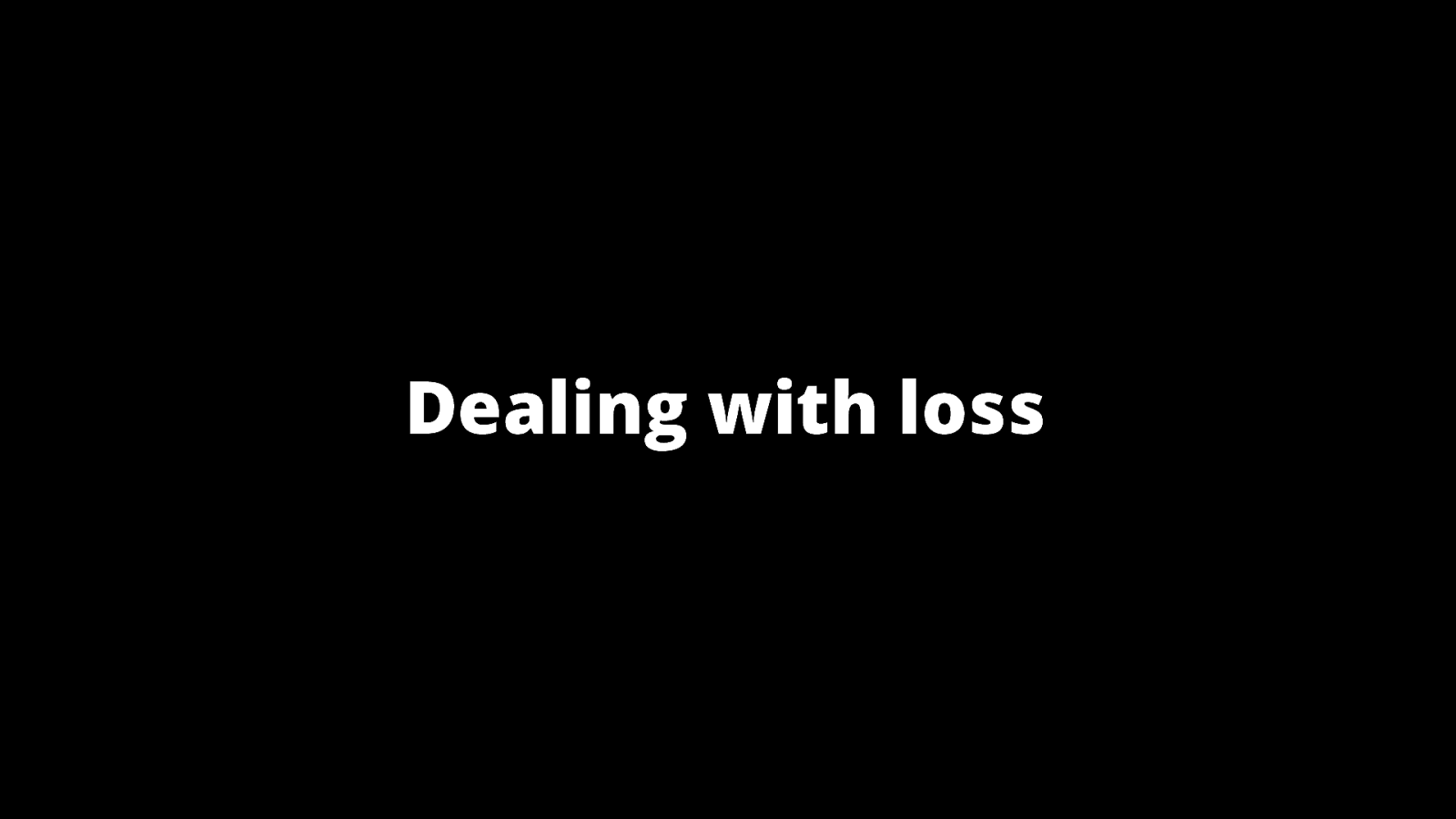
Dealing with loss
Another example of life weighing your mental health down comes from losing a loved one. In July of 2019, my mother-in-law Pat, was diagnosed with pancreatic cancer. For 2 years, much of it during the pandemic, our family day-to-day life was very different. We made everything we could out of every day.
In the summer of 2021 things got bad and my family needed me. And not just during the off hours. The balance was fully weighed down on the Life side.
It was difficult to watch big projects moving on without me. It was hard to keep a straight face during the times where I held some office hours to keep on top of things at work and help out where I could. Quarterly reporting just didn’t seem important.
I realized soon after all this went down that I had been given something important. I would not have been able to roll back into work, if my leadership had not supported me in doing what was right for my family. I realized that part of being a manager or a leader is knowing how to invest in your people and manage their burnout. As a leader, you need to focus on managing yourself, but you also need to watch for those on your team. What can you do to make room for your team members to be healthy? How can you make sure they have what they need? What questions do you need to ask? And when things happen, how do you react and support them?
Loss is a heavy burden to carry, and sometimes you need help to make it through. And sometimes your team members need YOUR help to make it through.
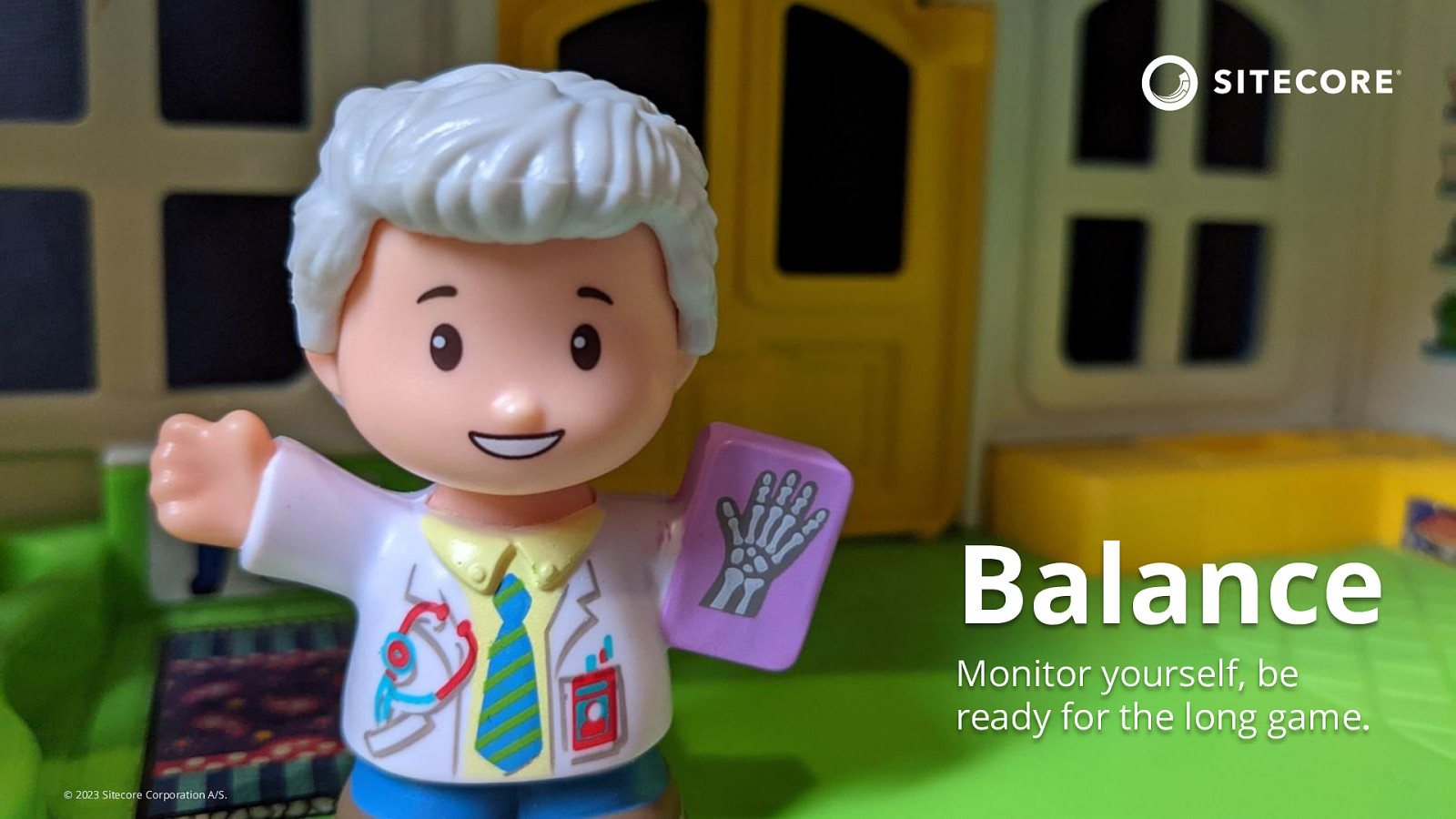
Balance
In the end, what these stories taught me, was that I needed to learn about how to balance EVERYTHING better. We’re told things like “Go have a vacation, you’ll feel better”. But it’s not fixing the underlying issue, right? It’s just a temporary fix. You wind up coming back to the exact same systemic issue that is there. And unless you resolve that systemic issue you don’t solve for the long game.
And so, balancing is a way of trying to be part of that solution for the systemic issue. And what I learned was it’s not just about work-life balance, it’s about balancing what can you handle from a mental health load, and look at all the aspects. Sometimes your life might need more of the balance than others.
The biggest thing to help me in learning this was that I started recognizing my Burnout symptoms. And now, monitoring your own mental health is not something that is easy to do. If you can get professional help for it that is awesome! But what I did know is that a short vacation was not going to do this. It’s not always going to solve the main problem, and you can’t always solve it by just balancing work responsibilities.
So sometimes, for me, it’s been about saying no to things, right? Reducing the number of things that are on my plate so that I can have fewer things that I’m having to focus on. And sometimes it’s about having a recharge outlet, like a hobby, right? For me, if I do 30 minutes of playing some video games on the Xbox, you know, I can feel myself starting to recharge, rebuilding my capacity. Sometimes it’s about shifting between different task types. Whether it’s procedural or strategic, right? Like if you’re doing too much of one, maybe take a break from that and give your brain a little bit of a rest.
It’s all about not overloading yourself. It’s kind of a marathon, it’s a very long game we’re running in and we have to ration ourselves. We have to be doing the things that are going to keep us going over that time.
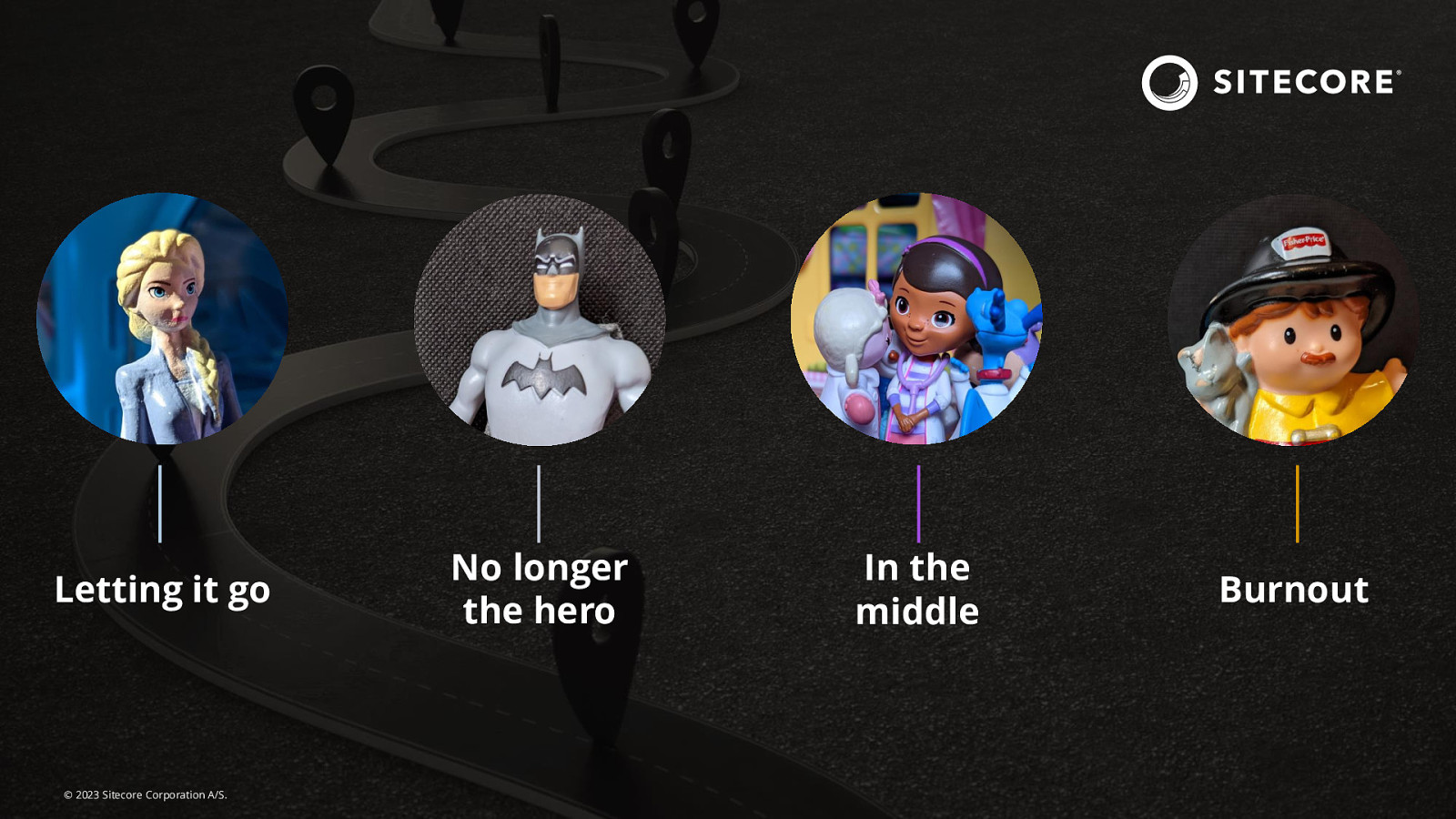
Wrapping it up
Now across this session I mentioned we’d look at those specific challenges and we looked at four topics. And you can use these and the stories in them to take those lessons as building blocks. Things that you can then do to start addressing other challenges that you see match in management.

What did I learn?
Now, the first thing we looked at was how do you share your load? How do you learn to delegate more of your tasks and take on a more strategic role on the team.
Next, and this is probably one of the most important ones, was listening. How do we make sure that we’re not being the hero, we’re not being the expert. Our leadership success is going to be about how well I can listen to others and make them the focus.
Also we need to learn how to say no, punch up for our team. How do we fight for our team and help them be able to do what they need to do.
And the final section was how do we balance? How do we monitor our mental health and make sure we’re balancing everything in our lives so that we can be here and ready that long game.
Now there’s a lot of stories we went through. Hopefully some of those experiences of mine are going to resonate with something you’re experiencing. There’s a bunch we didn’t go into today but if use these basic building blocks, I think you’re going to be able to find you can face a lot of things new challenges.
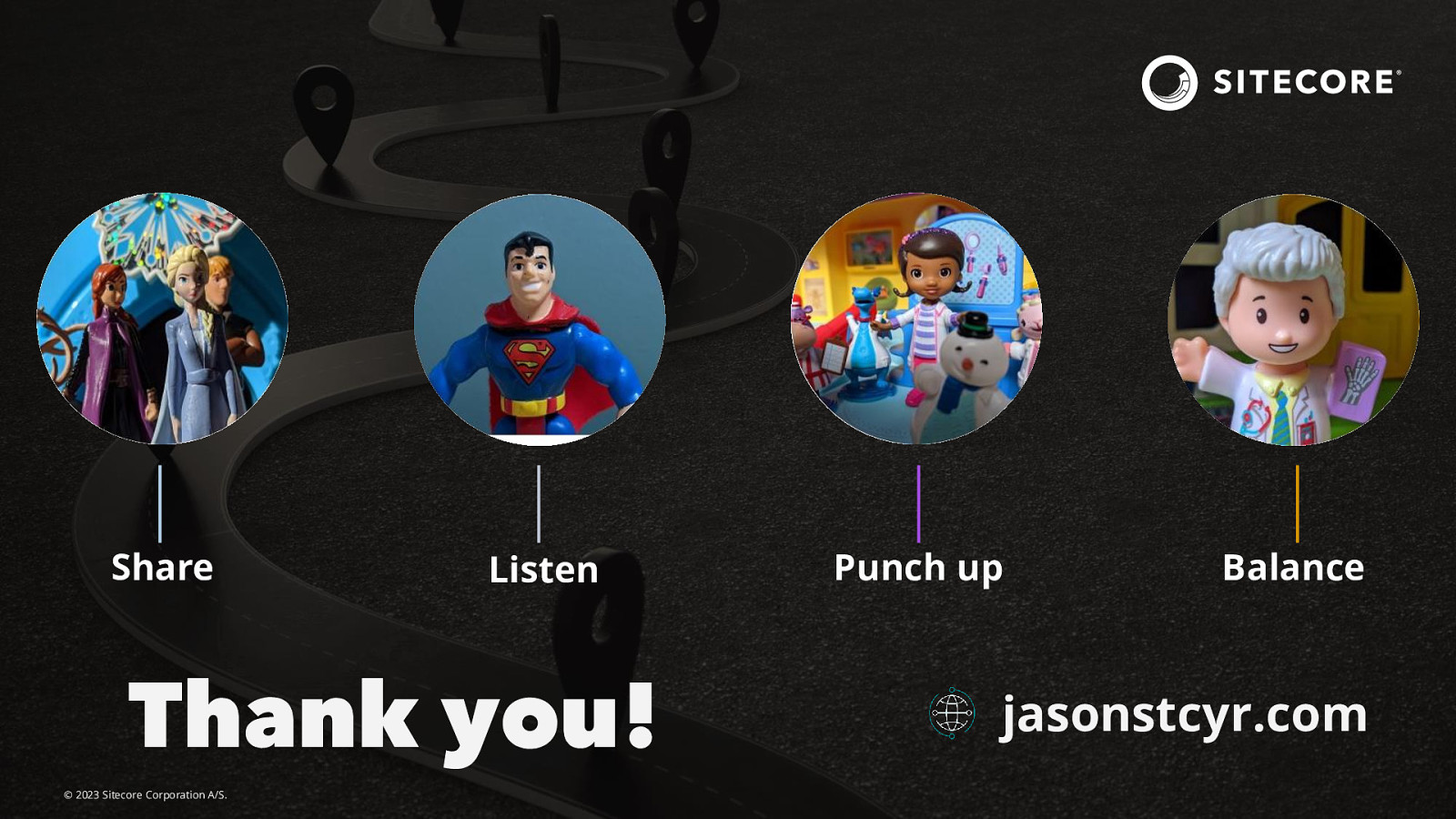
Thank you!
I know you got this! But, I’d like you to connect. You can find links to all my socials on my site, jasonstcyr.com. I want to hear about what are you going through? What challenges are you seeing?
For me this is a continuous learning path and hopefully we’ll see each other out there together.
Thank you very much for your time.
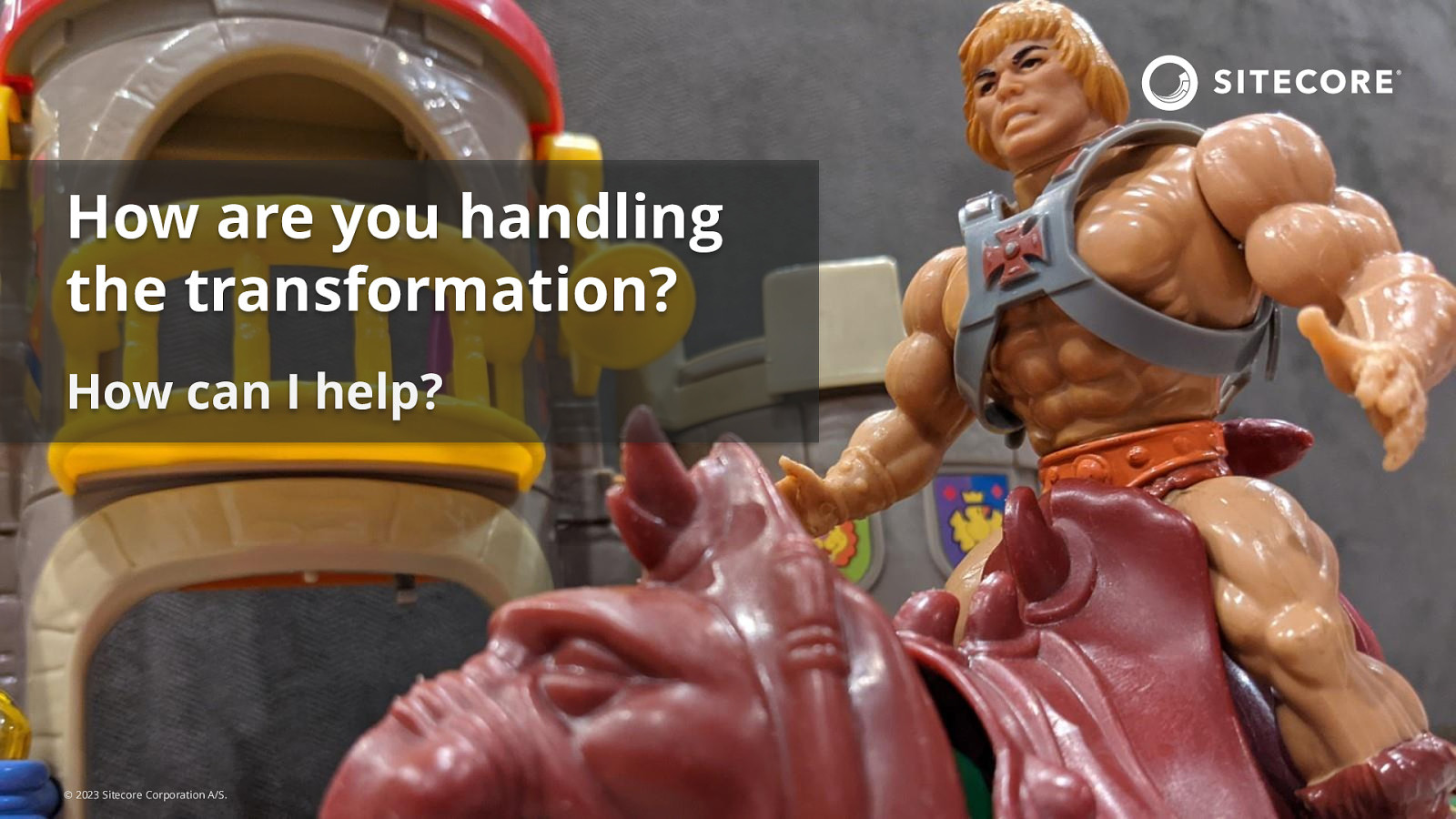
How are you handling the transformation?
How can I help?
I think we have a little bit of time now, so let’s move on to see if we have any questions from the audience!
One of the most difficult transitions to make is from being a member of the team, to owning your former teammates performance reviews. It is awkward. It is stressful. And you can do it! In this session, we’ll take a look at the challenges of making this transition and how you can face them head on. Leveraging the years of experience I’ve built up, you can learn from my healthy backlog of failures, poor decisions, and generally bad ideas. These mistakes were what helped me to learn, and now you can too!
Video
Resources
The following resources were mentioned during the presentation or are useful additional information.
-
Agile DevOps West recording of the session
A variation of this session with some additional content.
-
Letting it go
Blog version about the Letting it Go section of this talk.
-
Facing the unknown
A blog version of my ‘Facing the unknown’ content which I wasn’t able to include in this session.
Buzz and feedback
Here’s what was said about this presentation on social media.
-
I also really loved @StCyrThoughts’ talk Becoming A Leader In Your Team https://t.co/VWL3ku7FV5
— Kai Katschthaler (they/them) (@thegrumpyenby) January 27, 2023
Some really great insights that I found helpful despite not being in a manager position yet myself. I found his advice quite transferable to other change situations in jobs. -
I think I've already found my talk of the year!! I just listened to the amazing @StCyrThoughts give a talk titled, 'Stepping Up, Becoming A Leader In Your Team' at the @yougotthisconf.
— Nathaniel Okenwa (@chatterboxCoder) January 14, 2023
Genuinely amazing Speaker, you should check it out when it becomes available on Demand!! -
I'm excited to be speaking at @yougotthisconf this week with so many amazing people! There is such an amazing line up with all sorts of virtual sessions over the weekend. Make sure you pop in and check out some of these great speakers! https://t.co/HursLv4dRD
— Jason St-Cyr (@StCyrThoughts) January 9, 2023 -
Today is the day! You can now see our entire conference lineup and get free tickets on our website. We have 27 amazing talks focused on all areas of core skills - broadcasting live on January 14-15 2023. https://t.co/kISzG8I4JR #YouGotThisConf
— You Got This! (@yougotthisconf) November 18, 2022 -
Next up are @praveenasekhar @StCyrThoughts @eileenwhitener @KimberleyCook91 discussing a mix of core skills on leadership skills, community-building in a remote world, and failure as personal growth. Even if you're not a manager, there's value in all of these. #YouGotThisConf pic.twitter.com/34VGXUR8Xq
— You Got This! (@yougotthisconf) January 13, 2023
